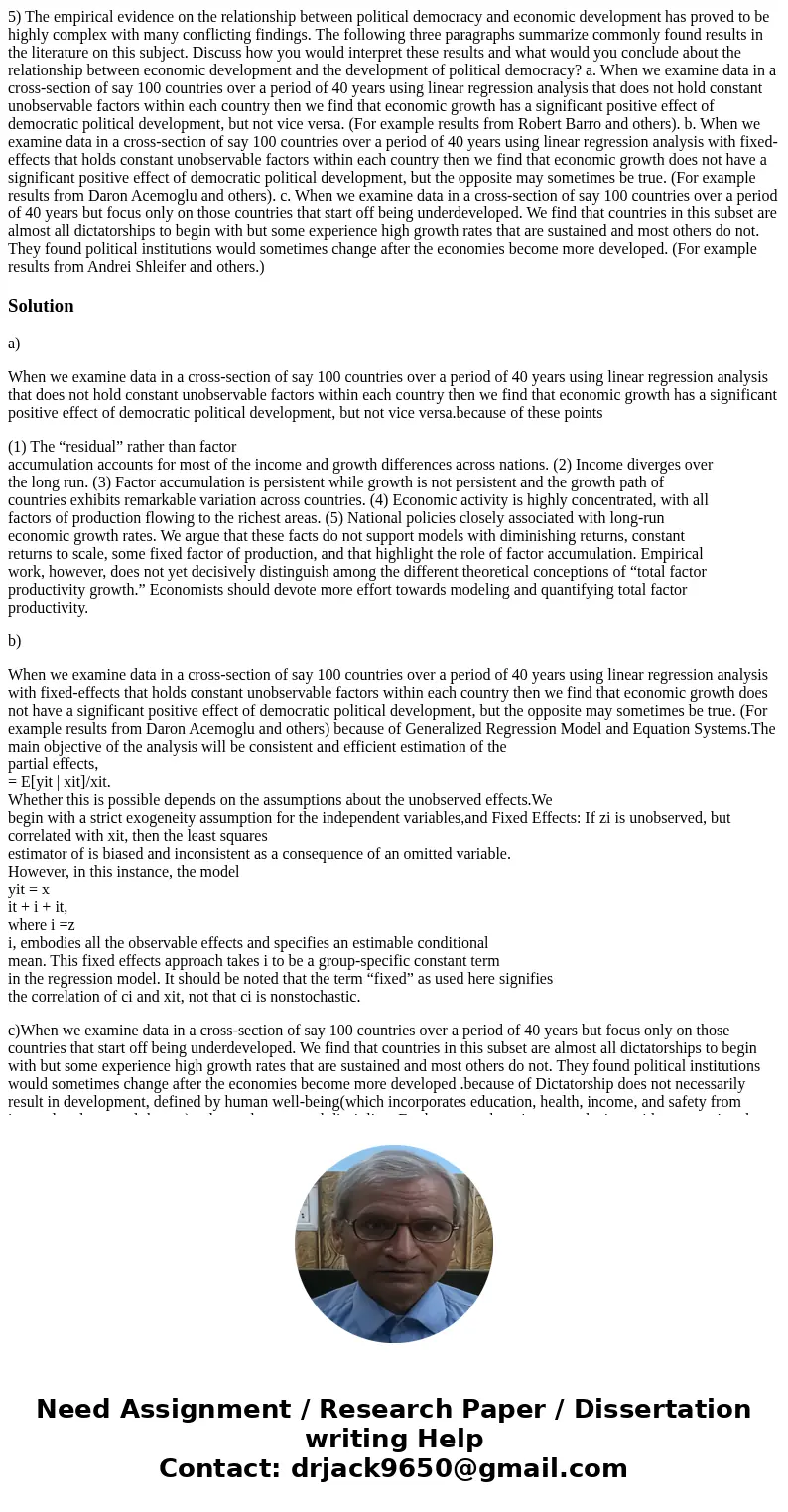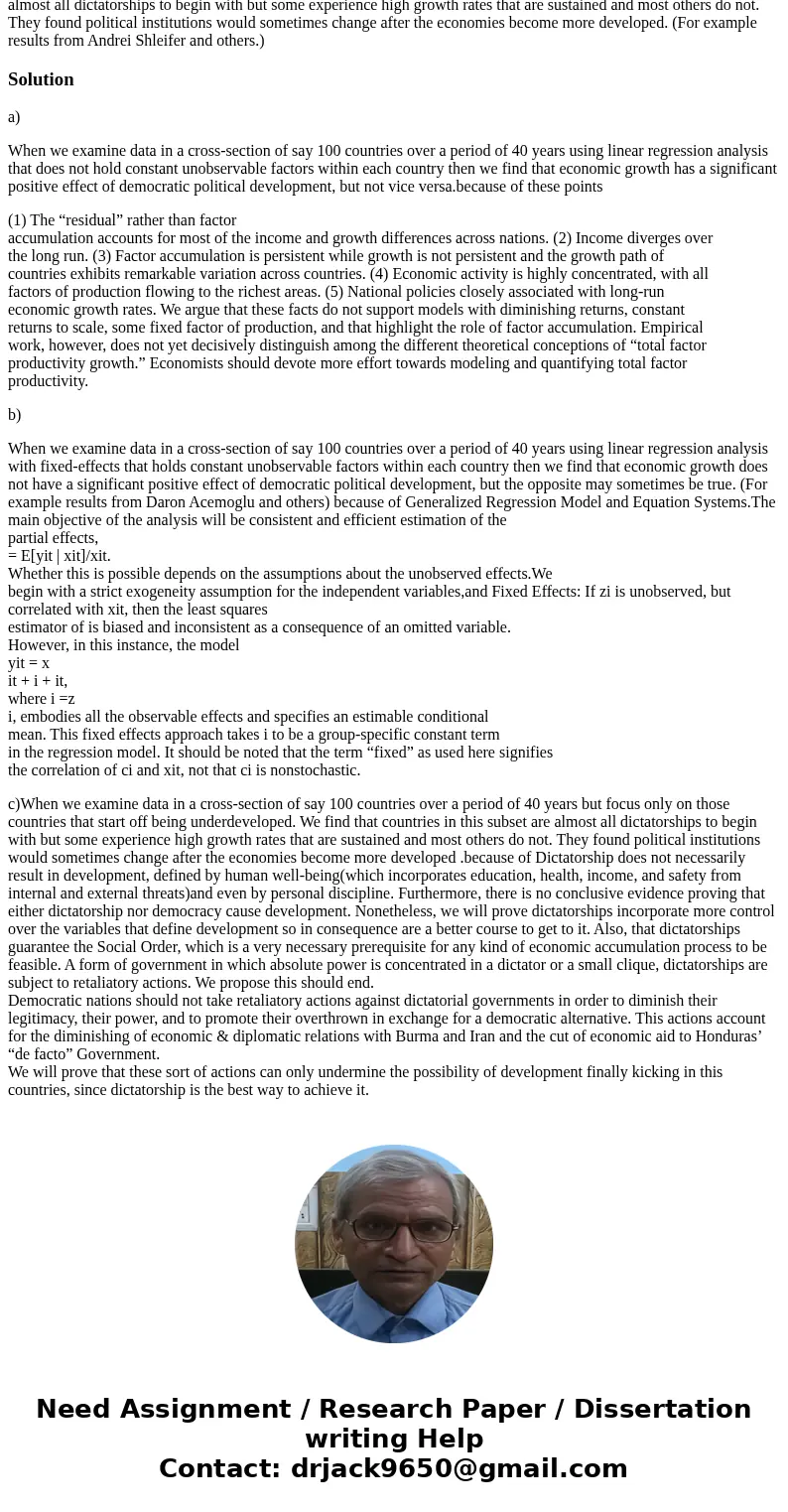5 The empirical evidence on the relationship between politic
5) The empirical evidence on the relationship between political democracy and economic development has proved to be highly complex with many conflicting findings. The following three paragraphs summarize commonly found results in the literature on this subject. Discuss how you would interpret these results and what would you conclude about the relationship between economic development and the development of political democracy? a. When we examine data in a cross-section of say 100 countries over a period of 40 years using linear regression analysis that does not hold constant unobservable factors within each country then we find that economic growth has a significant positive effect of democratic political development, but not vice versa. (For example results from Robert Barro and others). b. When we examine data in a cross-section of say 100 countries over a period of 40 years using linear regression analysis with fixed-effects that holds constant unobservable factors within each country then we find that economic growth does not have a significant positive effect of democratic political development, but the opposite may sometimes be true. (For example results from Daron Acemoglu and others). c. When we examine data in a cross-section of say 100 countries over a period of 40 years but focus only on those countries that start off being underdeveloped. We find that countries in this subset are almost all dictatorships to begin with but some experience high growth rates that are sustained and most others do not. They found political institutions would sometimes change after the economies become more developed. (For example results from Andrei Shleifer and others.)
Solution
a)
When we examine data in a cross-section of say 100 countries over a period of 40 years using linear regression analysis that does not hold constant unobservable factors within each country then we find that economic growth has a significant positive effect of democratic political development, but not vice versa.because of these points
(1) The “residual” rather than factor
accumulation accounts for most of the income and growth differences across nations. (2) Income diverges over
the long run. (3) Factor accumulation is persistent while growth is not persistent and the growth path of
countries exhibits remarkable variation across countries. (4) Economic activity is highly concentrated, with all
factors of production flowing to the richest areas. (5) National policies closely associated with long-run
economic growth rates. We argue that these facts do not support models with diminishing returns, constant
returns to scale, some fixed factor of production, and that highlight the role of factor accumulation. Empirical
work, however, does not yet decisively distinguish among the different theoretical conceptions of “total factor
productivity growth.” Economists should devote more effort towards modeling and quantifying total factor
productivity.
b)
When we examine data in a cross-section of say 100 countries over a period of 40 years using linear regression analysis with fixed-effects that holds constant unobservable factors within each country then we find that economic growth does not have a significant positive effect of democratic political development, but the opposite may sometimes be true. (For example results from Daron Acemoglu and others) because of Generalized Regression Model and Equation Systems.The main objective of the analysis will be consistent and efficient estimation of the
partial effects,
= E[yit | xit]/xit.
Whether this is possible depends on the assumptions about the unobserved effects.We
begin with a strict exogeneity assumption for the independent variables,and Fixed Effects: If zi is unobserved, but correlated with xit, then the least squares
estimator of is biased and inconsistent as a consequence of an omitted variable.
However, in this instance, the model
yit = x
it + i + it,
where i =z
i, embodies all the observable effects and specifies an estimable conditional
mean. This fixed effects approach takes i to be a group-specific constant term
in the regression model. It should be noted that the term “fixed” as used here signifies
the correlation of ci and xit, not that ci is nonstochastic.
c)When we examine data in a cross-section of say 100 countries over a period of 40 years but focus only on those countries that start off being underdeveloped. We find that countries in this subset are almost all dictatorships to begin with but some experience high growth rates that are sustained and most others do not. They found political institutions would sometimes change after the economies become more developed .because of Dictatorship does not necessarily result in development, defined by human well-being(which incorporates education, health, income, and safety from internal and external threats)and even by personal discipline. Furthermore, there is no conclusive evidence proving that either dictatorship nor democracy cause development. Nonetheless, we will prove dictatorships incorporate more control over the variables that define development so in consequence are a better course to get to it. Also, that dictatorships guarantee the Social Order, which is a very necessary prerequisite for any kind of economic accumulation process to be feasible. A form of government in which absolute power is concentrated in a dictator or a small clique, dictatorships are subject to retaliatory actions. We propose this should end.
Democratic nations should not take retaliatory actions against dictatorial governments in order to diminish their legitimacy, their power, and to promote their overthrown in exchange for a democratic alternative. This actions account for the diminishing of economic & diplomatic relations with Burma and Iran and the cut of economic aid to Honduras’ “de facto” Government.
We will prove that these sort of actions can only undermine the possibility of development finally kicking in this countries, since dictatorship is the best way to achieve it.


 Homework Sourse
Homework Sourse